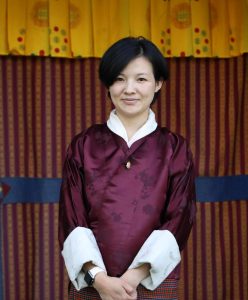Published on
Updated on

When joining the faculty of the only law school in her native country of Bhutan, Kuenzang Dolma (LLM ‘20) knew she needed to advance her knowledge of dispute resolution. This is because, as a new member of the teaching faculty at the Jigme Singye Wangchuck School of Law, Dolma was tasked with developing and leading the school’s new Alternative Dispute Resolution Clinic. After deliberation, Dolma chose one of the leading alternative dispute resolution (ADR) programs in the world at the University of Missouri School of Law.
“My experience at Mizzou Law was very enriching,” Dolma said. “It was a wonderful journey for me where I had the opportunity to grow in my personal and my professional life. The courses helped translate our learning to experiences outside of classroom, making me realize just how relevant and important they are to any human and even more so to law professionals practicing ADR.”
Before joining the faculty at JSW Law, Dolma earned an LLB from the Indian Law Society’s Law College at Pune University in Pune, India. She then worked as a lawyer for two district administrations in the western region of Bhutan. In 2017, JSW Law was founded as the first and only law school in the entire nation of Bhutan. Dolma was hired to serve on the faculty in 2018 before moving to Columbia, Missouri to earn her LLM in dispute resolution at Mizzou Law.
After completing her degree in 2020, Kuenzang moved back to Bhutan to complete the creation of the ADR Clinic at JSW Law, where she serves as clinic director. In this role, she teaches ADR courses and searches for institutional partners willing to engage her students in mediation. She also supervises her students when they engage with real clients. Experience, she says, that will be incredibly useful for students in their careers.
“Mediation is one of the widely practiced forms of dispute resolution in Bhutan,” Dolma said. “Our ADR Act of 2013 provides for mediators to facilitate between parties and not give opinions. However, based on my experience, I feel an evaluative style of mediation takes place most of the time, especially when village elders or non-professionally trained lawyers mediate. I think our culture is one of the reasons why, as parties expect the mediator to provide solution or advice.”
Dolma says the knowledge and skills she acquired at Mizzou Law have helped set her and her clinic up for success moving forward.
“I made the right choice by pursuing my LLM at Mizzou Law,” Dolma said. “I received very good student feedback from running the ADR Clinic and teaching negotiation this past spring semester. I feel that this is an outcome of my LLM degree, which gave me an opportunity to dive deeper into the dispute resolution field and prepared me for my career in teaching ADR. I want my students to realize how important what they are learning is to their daily lives and how useful it will be for their future careers. That is an outcome of how I truly felt throughout my time at Mizzou.”
For those considering the LLM Program at Mizzou Law, Dolma says, “If you are considering taking ADR or working in ADR then Mizzou Law’s program in dispute resolution is the program for you. You will have professors who will bring their in-depth knowledge and experience to help you in applying your learning beyond your classroom. In addition, you can take advantage of the professors’ focus on each student to fulfill your learning needs. This will help you take forward your learning to where you plan to go or to the institution or organization for which you are already working.”